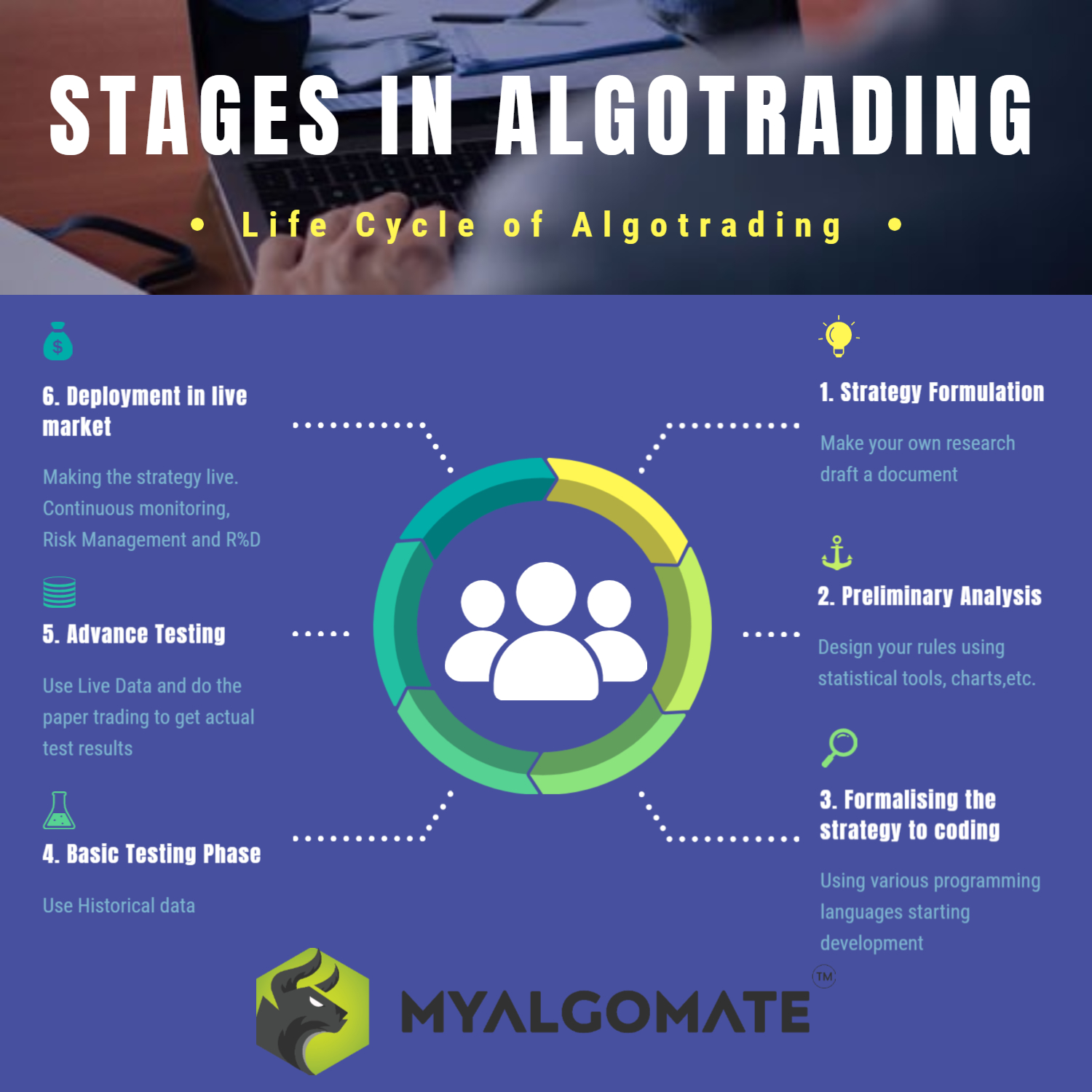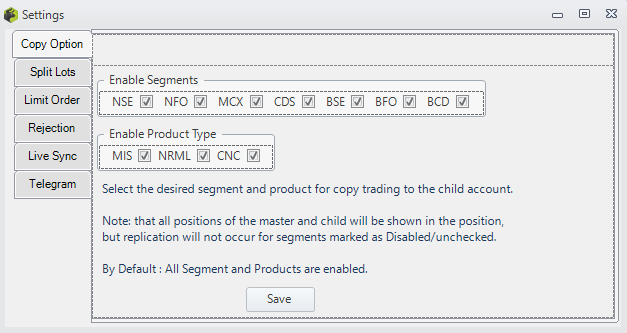To gain an understanding of algorithmic trading as a retail trader, this complete guide is sure to work well for your purpose. You will be able to find the basic concepts and advanced concepts related to algorithmic trading.
Going forward, this text includes:
- What is algorithmic trading?
- Why should retail traders do algorithmic trading?
- How can retail traders start algorithmic trading?
- Regulations
- Brokers for algorithmic trading
- Conclusion
What is Algorithmic Trading?
In simple terms, algorithmic trading means using a defined set of commands in the form of algorithms to generate trading signals and place orders. Each algorithm can be considered to have access to real-time and historical prices of items that can be purchased and sold after performing calculations in terms of prices. The algorithm can break the order into smaller pieces and do it at different times to get the best value.
According to the Economic Times, reports suggest that the size of the algorithmic trading market is expected to grow from $ 11.1 billion in 2019 to $ 18.8 billion by 2024, an increase in the combined annual growth rate (CAGR) of 11.1 percent. It is also said that algorithmic trading has ushered in a new era of markets, the benefits of which are not yet fully realized. Getting used to this new trading method can ensure better results. Trading Algo is now a ‘necessity for survival in the financial markets of the future because the future of trading lies in the machinery.
Algorithmic trading offers several advantages over manual trading. Quick trading performance, accuracy, the ability to get rid of ‘emotions’ while trading, and 100% compatibility with a fixed algorithmic trading strategy are some of the advantages.
To learn more about Algorithmic trading, you can refer to the article here.
Should retailers be involved in Algorithmic Trading?
Absolutely! Let us find out what is the scene like for retail traders when it comes to algorithmic trading.
Why Should Retail Traders Do Algorithmic Trading?
Retail traders are the ones which had remained deprived of algorithmic trading for a long time. But, now, retail traders are showing interest in algorithmic trading since companies or brokers are supporting retail algo traders.
The most important thing is that traders need to understand that in order to enter the algo trading world, they need to have good knowledge of investing and trading algorithmic.
Although, non-participation in algorithmic trading may have an impact on trading traders because, in the market, algorithmic traders may be more powerful than manual traders.
Algorithmic trading brings a number of benefits even for traders who trade in the financial markets. Known for:
- Increase execution rate
- Order your trading decisions
- Increase your market access
- Help make organized trading
- Help eliminate constant market monitoring
- Perform real-time quantitative analysis
Increase execution rate
The main reason is that if you are trading a profitable strategy for you, you need to be able to increase the speed of making a profitable trade happen faster. In trading, you go out with a profit only when your win compensates for your loss. Again, it is enough to answer for your efforts and your expenses. Algorithmic trading is a way to do the same.
Order your trading decisions
Another reason is that traditionally shopkeepers have been trading the gut feeling based on market ‘feelings.’ There is nothing wrong with that especially if you are an experienced player with a lot of market understanding to use. However, gut feeling often turns out to be wrong, especially when greed and fear are involved. When markets fall, many amateur traders sell quickly as they fear further danger. Algorithmic trading follows the recently enacted rules of exit-entry that prohibit such emotional trading and therefore losses can be avoided.
Increase your market access
One of the main reasons why Quantitative trading has always been popular is because it allows traders to create strategies in bulk. In addition, it uses modeling techniques to manage risks. This enables them to trade in commodities such as options and derivatives that are highly variable for trading players.
Help make organized trading
With predetermined factors such as time, price, quantity, and other market conditions encountered by algorithmic trading, it is known to make trading more orderly. Systematic trading makes more accurate predictions of stock prices and thus, makes trading more profitable.
Help eliminate constant market monitoring
Algorithms can monitor and make decisions and perform tasks related to market movements. Therefore, the need to continue to monitor the market manually during trading is unnecessary.
Perform real-time quantitative analysis
Algorithms can be implemented from previous data to assist traders in analyzing strategy performance for profit and loss as well as certain popular performance statistics such as Sharpe ratio, alpha, beta, etc. on their mistakes in the pre-made environment before using the strategy in live markets.
You can read an interesting article here, in which we have covered why you should be doing algorithmic trading.
Now, let us find out how retail traders can start with algorithmic trading.
How Can Retail Traders Start Algorithmic Trading?
To start algorithmic trading, you should have a detailed knowledge of certain things. For that, you must invest your time and efforts in the following:
- Knowledge
- Strategies
- Workflow
Knowledge
Getting knowledge on anything in this world should be the first step you take to reach that goal. Once you know the basics of algorithmic trading, you will be able to take the next step forward. To find the information you need:
- Training, you can join an organization as a trainer or trainer to become familiar with the process and work ethic.
- Books play an important role because they can be your best guide to getting started with algorithmic trading. Read about all the important books you may need for your best effort here.
These are books on all those topics related to algorithmic trading. Read this blog and you will be guided by a step-by-step journey on “learning algorithmic trading”. Both books are for beginners and advanced traders.
Also, you should have trading experience. First of all, with algorithmic trading, you should know about:
- types of trading instruments (stocks, options, currencies, etc.),
- types of strategies (Trend Following, Mean Reversal, etc.),
- arbitrage opportunities,
- options pricing models, and
- risk management
Strategies
Algorithm trading strategies are a variety of ideas to make algorithmic trading more profitable. The most popular strategies are:
- Market Making Strategies
- Arbitrage Strategies
- Statistical Strategies
- Momentum Strategies
- Sentiment Based Trading Strategies
- Machine Learning Trading Strategies
You can read more on the trading strategies in the reference article here.
Workflow

The diagram above shows the phases or flow of algorithmic trading activity. The broker you will be associated with can guide you with these steps. Every broker differs concerning the steps, and thus, you may find little difference but the purpose is the same.
Other suggested reads:
To find out more about getting started with algorithmic trading, you can check out the blog here.
Going forward, we will look at the regulations that one needs to take care of before starting with algorithmic trading.
Regulations
From an exchange perspective when a broker gives his clients an API to create an automated automation algorithm is known as algorithmic trading. These algorithms need to be approved and are usually owned by the broker who offers them.
INDIA
Recently, many brokers in India or third parties offer an API. This API interacts with web-based broker trading platforms. These web platforms are exchange-approved and have all risk rules in place for internet-based trading.
According to Economic Times on November 29, 2017, Sebi was among the first regulators to issue a discussion paper proposing the strengthening of rules on Algo trading in August 2016. It produced a set of seven proposals aimed at creating a level playing field between institutional investors and retail investors.
However, it did not finalize the regulations due to a lack of clarity on the impact of these laws on the market. In addition, the regulation side is moving faster and in India, regulators are developing a framework for setting guidelines according to Finapolis.
Brokers for Algorithmic Trading
While selecting an algorithmic trading broker, you can consider that broker which is amongst the most reliable ones. We have a list for you in the same context. First, we have covered brokers for algorithmic trading in India, then we also have provided you with the list of brokers from the USA, UK, EU, Singapore, and Canada for algorithmic trading.
Algorithmic Trading Brokers in India
Conclusion
This article explores the key features of algorithmic trading from the point of view of the retail trader. We have discussed what algorithmic trading is, why, and how. Also, by doing algorithmic trading the trader needs to be familiar with the rules of action with legal approval. We have also included some well-known traders in the article who assist with algorithmic trading and guide the step-by-step process of making a trade. We then discuss the benefits and lessons to get you the best information on getting started. If you want to build proficiency in algorithmic trading, a thorough knowledge of the domain is required. That is why we cover each topic with a wide range of content.
Disclaimer: All data and information provided in this article are for informational purposes only. Myalgomate™ makes no representations as to accuracy, completeness, correctness, suitability, or validity of any information in this article and will not be liable for any errors, omissions, or delays in this information or any losses, injuries, or damages arising from its display or use. All information is provided on an as-is basis.






1 Comment
Why You Should Be Doing Algorithmic Trading? - Myalgomate
August 17, 2021[…] Having said that, let me tell you a few important but important details about Algorithmic Trading here. […]